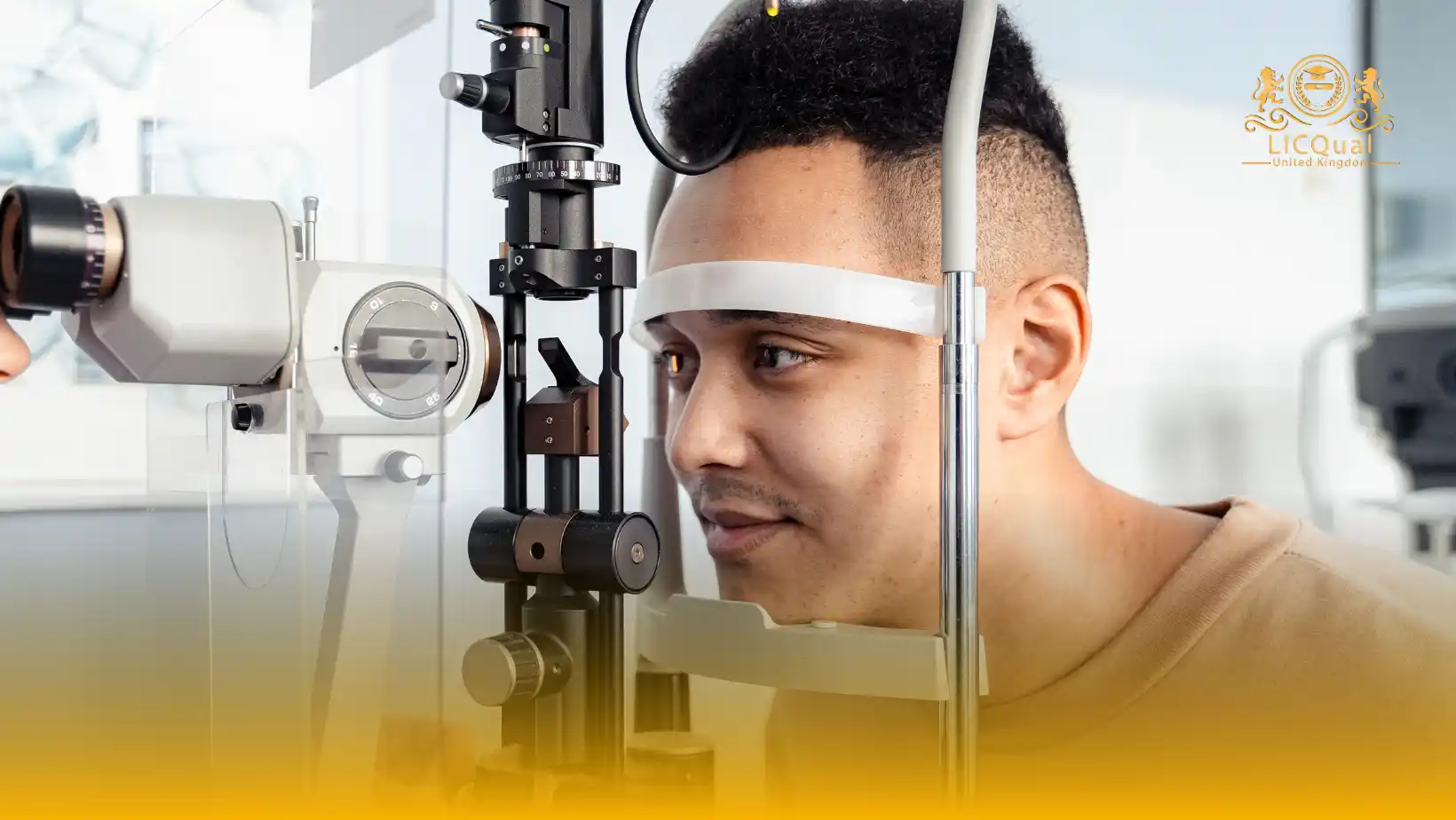The LICQual Level 3 Certificate in Ophthalmology (Cert O) is a specialised qualification designed for healthcare professionals seeking to enhance their expertise in the diagnosis, treatment, and management of eye-related diseases and conditions. This programme provides learners with the essential knowledge and skills to better understand ophthalmic science while supporting their career progression and Continuing Professional Development (CPD).
Unlike entry-level courses, this qualification is not intended for fresh candidates. Instead, it has been specifically developed for individuals already working in healthcare, medicine, or allied health professions who aim to expand their specialist knowledge and clinical competencies in ophthalmology. Learners will explore vital areas such as ocular anatomy and physiology, common ophthalmic disorders, diagnostic imaging techniques, surgical and non-surgical treatments, as well as advances in eye care and patient management.
The qualification blends theoretical learning with practical applications, ensuring that learners can apply their skills effectively in professional practice. By completing this course, professionals will be better equipped to contribute to improved patient care, collaborate in multidisciplinary healthcare teams, and take on more advanced roles within the medical sector.
Centres offering this programme must ensure high-quality delivery through qualified and experienced staff, access to appropriate clinical and academic resources, and robust support systems that promote learner success.
The LICQual Level 3 Certificate in Ophthalmology is an excellent choice for healthcare practitioners who wish to broaden their expertise, gain international recognition, and advance their careers in the ever-evolving field of eye health and medical sciences.
Course Overview
Qualification Title
LICQual Level 3 Certificate in Ophthalmology (Cert O)
Total Units
6
Total Credits
24
GLH
120
Qualification #
LICQ2200850
Qualification Specification
To enroll in the LICQual Level 3 Certificate in Ophthalmology (Cert O), applicants must meet the following criteria:
|
Qualification# |
Unit Title |
Credits |
GLH |
|---|---|---|---|
|
LICQ2200850-1 |
Fundamentals of Ophthalmology |
4 |
20 |
|
LICQ2200850-2 |
Diagnostic Techniques in Ophthalmology |
4 |
20 |
|
LICQ2200850-3 |
Common Ophthalmic Disorders |
4 |
20 |
|
LICQ2200850-4 |
Clinical Management and Treatment |
4 |
20 |
|
LICQ2200850-5 |
Preventive Ophthalmology and Public Health |
4 |
20 |
|
LICQ2200850-6 |
Professional Practice and CPD in Ophthalmology |
4 |
20 |
By the end of this course, learners will be able to:
Unit 1: Fundamentals of Ophthalmology
By the end of this unit, learners will be able to:
- Explain the anatomy and physiology of the eye and visual pathways.
- Describe the normal functioning of the ocular system and visual processes.
- Identify common ocular conditions and their impact on eye health.
- Apply foundational knowledge to clinical and professional practice.
Unit 2: Diagnostic Techniques in Ophthalmology
By the end of this unit, learners will be able to:
- Demonstrate knowledge of standard ophthalmic examination techniques.
- Interpret imaging and diagnostic results accurately.
- Conduct visual acuity assessments and apply findings to clinical decisions.
- Apply diagnostic tools effectively in patient case scenarios.
Unit 3: Common Ophthalmic Disorders
By the end of this unit, learners will be able to:
- Recognise and describe common eye disorders, including refractive errors, cataracts, and glaucoma.
- Analyse retinal, corneal, and ocular infection conditions.
- Identify urgent and emergency ophthalmic conditions.
- Evaluate the impact of ophthalmic disorders on patient quality of life.
Unit 4: Clinical Management and Treatment
By the end of this unit, learners will be able to:
- Evaluate pharmacological and non-pharmacological treatment options.
- Explain the role of surgical interventions in ophthalmology.
- Develop patient-centred management and follow-up plans.
- Collaborate effectively within multidisciplinary healthcare teams.
Unit 5: Preventive Ophthalmology and Public Health
By the end of this unit, learners will be able to:
- Explain strategies for promoting eye health and preventing ocular disease.
- Evaluate the importance of screening programmes and early detection.
- Apply lifestyle and preventive measures to reduce risk factors.
- Develop public health initiatives and patient education strategies.
Unit 6: Professional Practice and CPD in Ophthalmology
By the end of this unit, learners will be able to:
- Demonstrate professional and ethical standards in ophthalmology practice.
- Apply evidence-based approaches to clinical and patient care.
- Reflect on practice and implement strategies for Continuing Professional Development (CPD).
- Plan career development pathways and professional growth within ophthalmology.
The LICQual Level 3 Certificate in Ophthalmology (Cert O) is designed for healthcare professionals who want to strengthen their expertise in eye care, ophthalmic science, and patient management. This Ophthalmology Level 3 course is ideal for those seeking career progression, CPD accreditation, and internationally recognized certification. Whether you are a doctor, nurse, or allied health professional, this program provides the skills and knowledge to excel in ophthalmology practice.
1. Medical Doctors and Physicians
- Enhance clinical knowledge in ocular anatomy and physiology
- Gain advanced skills in diagnosing ophthalmic disorders
- Strengthen expertise in surgical and non-surgical eye care
- Improve patient outcomes with evidence-based practices
- Earn a globally recognized ophthalmology certification
2. Nurses and Allied Health Professionals
- Build confidence in supporting ophthalmic procedures
- Learn diagnostic imaging in ophthalmology
- Expand scope of practice with specialized training
- Fulfill continuing professional development (CPD) requirements
- Increase employability in hospitals and clinics
3. Optometrists and Eye Care Specialists
- Deepen understanding of ocular disease management
- Stay updated with the latest diagnostic techniques
- Strengthen patient care and referral pathways
- Gain recognition with a Level 3 Ophthalmology qualification
- Broaden career opportunities in eye health services
4. Healthcare Educators and Trainers
- Integrate ophthalmology knowledge into teaching programs
- Enhance credibility with an international certification
- Support students with up-to-date clinical insights
- Strengthen academic and professional profiles
- Contribute to evidence-based ophthalmology education
5. Public Health and Community Health Workers
- Address the growing burden of eye-related diseases
- Learn preventive strategies for vision health
- Support community awareness programs in ophthalmology
- Gain skills to manage common ocular conditions
- Strengthen role in primary healthcare delivery
6. International Healthcare Professionals
- Obtain a globally recognized ophthalmology certificate
- Align with UK and international healthcare standards
- Improve career mobility across countries
- Gain competitive advantage in global healthcare markets
- Access structured, flexible learning for busy professionals
7. Career Changers in Healthcare
- Transition into the field of ophthalmology with confidence
- Acquire foundational and advanced knowledge in eye care
- Build a strong profile for specialist healthcare roles
- Demonstrate commitment to professional growth
- Open pathways to further study and specialization
Centres delivering the LICQual Level 3 Certificate in Ophthalmology (Cert O) must maintain the highest standards of training to ensure learners gain professional knowledge, practical skills, and the ability to apply learning in real-world settings.
Key Centre Requirements:
- Qualified and Competent Staff
- Trainers and assessors must hold relevant qualifications and clinical experience in ophthalmology, healthcare, or related medical fields.
- Staff should demonstrate teaching, assessment, and mentoring capabilities to support learner success.
- Access to Learning Resources
- Centres must provide up-to-date textbooks, clinical references, case studies, and digital resources aligned with international ophthalmology standards.
- Learners should have access to research materials, journals, and evidence-based clinical guidelines.
- Practical and Clinical Facilities
- Centres should offer access to eye care equipment, diagnostic tools, and simulation or practical training environments.
- Opportunities for applied learning and case-based practice are essential to reinforce theoretical knowledge.
- Assessment and Quality Assurance
- Centres must implement fair, valid, and reliable assessment systems to measure learner competency.
- Internal quality assurance processes must ensure compliance with LICQual standards and continuous improvement.
- Learner Support and CPD
- Centres must provide mentoring, guidance, and structured feedback to support learners throughout the course.
- Trainers should engage in ongoing professional development to maintain current knowledge in ophthalmology.
- Safe and Professional Learning Environment
- Centres must ensure a supportive and safe environment that fosters ethical practice, evidence-based care, and professional conduct.
By fulfilling these requirements, centres can deliver high-quality ophthalmology training that equips learners with the knowledge, skills, and confidence to excel in their professional roles and advance their careers in eye care.
Assessment and Verification
All units within this qualification are subject to internal assessment by the approved centre and external verification by LICQual. The qualification follows a criterion-referenced assessment approach, ensuring that learners meet all specified learning outcomes.
To achieve a ‘Pass’ in any unit, learners must provide valid, sufficient, and authentic evidence demonstrating their attainment of all learning outcomes and compliance with the prescribed assessment criteria. The Assessor is responsible for evaluating the evidence and determining whether the learner has successfully met the required standards.
Assessors must maintain a clear and comprehensive audit trail, documenting the basis for their assessment decisions to ensure transparency, consistency, and compliance with quality assurance requirements.







